Artificial Intelligence and Sustainability—A Review
Abstract
1. Introduction
2. Initial Literature Review
2.1. AI for Sustainability
2.2. Sustainability of AI
2.3. Combining AI for Sustainability and Sustainability of AI
3. Research Methodology
3.1. Definition of Scope and Objective
3.2. Search for Relevant Literature
- Google Scholar
- Science Direct
- IEEE
- Springer Link
- Elicit.org
- ACM Digital Library
- AIS eLibrary
- AI Sustainability
- Artificial intelligence sustainability
- Sustainable AI
- AI environmental impact
- AI economic impact
- AI social impact
- Artificial intelligence environmental impact
- Artificial intelligence economic impact
- Artificial intelligence social impact
- AI ethics
3.3. Screening and Selection of Literature
3.3.1. Inclusion Criteria
- I1: Abstract explicitly highlights the topic of AI sustainability. This criterion helped us to only choose research papers having both components and to remove the papers talking about AI in some other context, and not explicitly stating either AI for sustainability or the impact of AI on sustainability.
- I2: The paper’s focus aligns with the chosen research focus. While going through the paper, if the research paper did not cohesively talk about AI sustainability, then that paper was not included in our analysis.
- I3: Abstract and keywords contain key terms related to the topic. Using this, we eliminated papers that contained the keywords of AI sustainability, but whose content was outside the scope of our research.
3.3.2. Exclusion Criteria
- E1: Content focuses only on a specific niche sub-field of research regarding AI sustainability. To have an overall understanding of our topic, papers corresponding to a niche-specific sub-field of research with AI sustainability were not included.
- E2: Publication date before 2000 (or after the first half of 2023). This criterion is useful because very few papers on this topic exist in the year range 2010–2018. Further, the year range 2000–2010 did not give any significant results. Hence, keeping the threshold at 2000 helped us to make our analysis extensive and at the same time a bit more efficient. The cut-off of our search and analysis is the first half of 2023.
- E3: Abstract does not cover AI sustainability. To ensure that the analysis is strictly within the scope of our research, we excluded those papers whose abstracts exhibited a complete absence of any reference to AI sustainability.
- E4: Full paper not accessible. Papers that looked relevant from the title and first information, but were not accessible, were also excluded from our analysis.
- E5: Language not in English. Non-English papers were excluded from our analysis due to limitations in the authors’ language proficiency.
3.4. Classification Scheme and Systematic Map
3.5. Interpretation of Findings and Review Output
4. Results and Visualization
4.1. RQ1: How Does the Existing Literature Capture AI Sustainability?
4.2. RQ2: What Is the Maturity Level of the Research Field of AI Sustainability?
4.2.1. Publication Years: When Did Research on AI Sustainability Become Active in the Artificial Intelligence Field?
4.2.2. Contribution Types: What Are the Different Approaches in the Existing Literature?
4.2.3. Authorship Analysis
- Banking and Finance: This field consists of backgrounds such as finance, accounting, banking, etc.
- Business Administration: The authors in this field have backgrounds related to economics, business administration, management, entrepreneurship, etc.
- Engineering and Technology: This field comprises backgrounds such as software engineering, computer engineering, electrical engineering, industrial engineering, information technology, civil engineering, environmental engineering, biomedical engineering, etc.
- Health Science: This field consists of authors from backgrounds like health labs, medical institutes, health research centers, Doctor of Medicine candidates, life sciences, etc.
- Information Systems: The authors in this field have backgrounds related to artificial intelligence, machine learning, data science, etc. Furthermore, some authors had job titles more suited to the research field of “Engineering and Technology”. However, their work profiles were more suited to information systems. Hence, they have been placed in this field.
- Law: Authors in this research field are predominantly associated with law faculties or departments.
- Natural Science: This field comprises backgrounds such as sustainability, freshwater ecology, energy, climate change, etc.
- Social Sciences: The authors in this field have backgrounds related to philosophy, theology, religion and culture, public affairs, social studies, internal and regional studies, etc.
4.2.4. Breadth of Methods Analysis
4.3. RQ3: What Is the Future Research Agenda of the Research Field of AI Sustainability?
5. Discussion and Limitations
5.1. Construct Validity
5.2. Conclusion Validity
6. Conclusions
Author Contributions
Funding
Informed Consent Statement
Data Availability Statement
Conflicts of Interest
Abbreviations
| AI | Artificial Intelligence |
| CV | Computer Vision |
| FSSD | Framework for Strategic Sustainable Development |
| IoT | Internet of Things |
| LLMs | Large Language Models |
| ML | Machine Learning |
| NLP | Natural Language Processing |
| SCAIS | Sustainability Criteria and Indicators for Artificial Intelligence Systems |
| SDGs | Sustainable Development Goals |
| SLR | Systematic Literature Review |
| SMS | Systematic Mapping Study |
References
- Russell, S.; Norvig, P. Artificial Intelligence: A Modern Approach, 4th ed.; Pearson Education Limited: Oxford, UK, 2021. [Google Scholar]
- Davenport, T.H.; Ronanki, R. Artificial intelligence for the real world. Harv. Bus. Rev. 2018, 96, 108–116. [Google Scholar]
- Enholm, I.M.; Papagiannidis, E.; Mikalef, P.; Krogstie, J. Artificial Intelligence and Business Value: A Literature Review. Inf. Syst. Front. 2022, 24, 1709–1734. [Google Scholar] [CrossRef]
- Lee, D.; Yoon, S.N. Application of Artificial Intelligence-Based Technologies in the Healthcare Industry: Opportunities and Challenges. Int. J. Environ. Res. Public Health 2021, 18, 271. [Google Scholar] [CrossRef] [PubMed]
- Abduljabbar, R.; Dia, H.; Liyanage, S.; Bagloee, S.A. Applications of Artificial Intelligence in Transport: An Overview. Sustainability 2019, 11, 189. [Google Scholar] [CrossRef]
- Jha, K.; Doshi, A.; Patel, P.; Shah, M. A comprehensive review on automation in agriculture using artificial intelligence. Artif. Intell. Agric. 2019, 2, 1–12. [Google Scholar] [CrossRef]
- Ahmad, T.; Zhang, D.; Huang, C.; Zhang, H.; Dai, N.; Song, Y.; Chen, H. Artificial intelligence in sustainable energy industry: Status Quo, challenges and opportunities. J. Clean. Prod. 2021, 289, 125834. [Google Scholar] [CrossRef]
- Chan-Olmsted, S.M. A Review of Artificial Intelligence Adoptions in the Media Industry. Int. J. Media Manag. 2019, 21, 193–215. [Google Scholar] [CrossRef]
- Sætra, H.S. AI in Context and the Sustainable Development Goals: Factoring in the Unsustainability of the Sociotechnical System. Sustainability 2021, 13, 1738. [Google Scholar] [CrossRef]
- Strubell, E.; Ganesh, A.; McCallum, A. Energy and Policy Considerations for Deep Learning in NLP. In Proceedings of the 57th Annual Meeting of the Association for Computational Linguistics, Florence, Italy, 28 July–2 August 2019; pp. 3645–3650. [Google Scholar] [CrossRef]
- Santor, E. The Impact of Digitalization on the Economy: A Review Article on the NBER Volume “Economics of Artificial Intelligence: An Agenda”. Int. Product. Monit. 2020, 39, 81–90. [Google Scholar]
- Dastin, J. Amazon scraps secret AI recruiting tool that showed bias against women. In Ethics of Data and Analytics; Auerbach Publications: Boca Raton, FL, USA, 2022; pp. 296–299. [Google Scholar]
- Larson, J.; Angwin, J.; Kirchner, L.; Mattu, S. Machine Bias: There’s Software Used across the Country to Predict Future Criminals. And Its Biased against Blacks. Fed. Probat. 2016, 80, 38. [Google Scholar]
- Jin, Z.; Cao, J.; Guo, H.; Zhang, Y.; Wang, Y.; Luo, J. Detection and analysis of 2016 us presidential election related rumors on twitter. In Proceedings of the Social, Cultural, and Behavioral Modeling: 10th International Conference, SBP-BRiMS 2017, Washington, DC, USA, 5–8 July 2017; Proceedings 10. Springer: Berlin/Heidelberg, Germany, 2017; pp. 14–24. [Google Scholar]
- Bovet, A.; Makse, H.A. Influence of fake news in Twitter during the 2016 US presidential election. Nat. Commun. 2019, 10, 7. [Google Scholar] [CrossRef]
- Krittanawong, C.; Narasimhan, B.; Virk, H.U.H.; Narasimhan, H.; Hahn, J.; Wang, Z.; Tang, W.W. Misinformation dissemination in twitter in the COVID-19 era. Am. J. Med. 2020, 133, 1367–1369. [Google Scholar] [CrossRef]
- Purvis, B.; Mao, Y.; Robinson, D. Three Pillars of Sustainability: In Search of Conceptual Origins. Sustain. Sci. 2019, 14, 681–695. [Google Scholar] [CrossRef]
- Van Wynsberghe, A. Sustainable AI: AI for Sustainability and the Sustainability of AI. AI Ethics 2021, 1, 213–218. [Google Scholar] [CrossRef]
- McCarthy, J. What is Artificial Intelligence? 2007. Available online: http://www-formal.stanford.edu/jmc/whatisai/ (accessed on 31 August 2023).
- Chen, Z.; Wu, M.; Chan, A.; Li, X.; Ong, Y.S. Survey on AI Sustainability: Emerging Trends on Learning Algorithms and Research Challenges [Review Article]. IEEE Comput. Intell. Mag. 2023, 18, 60–77. [Google Scholar] [CrossRef]
- Larsson, S.; Anneroth, M.; Felländer, A.; Felländer-Tsai, L.; Heintz, F.; Ångström, R. Sustainable AI: An Inventory of the State of Knowledge of Ethical, Social, and Legal Challenges Related to Artificial Intelligence. AI Sustainability Center. 2019. Available online: https://www.lunduniversity.lu.se/lup/publication/e2fa1b6a-860e-44b0-a359-fbd842c363db (accessed on 31 August 2023).
- Nishant, R.; Kennedy, M.; Corbett, J. Artificial intelligence for sustainability: Challenges, opportunities, and a research agenda. Int. J. Inf. Manag. 2020, 53, 102104. [Google Scholar] [CrossRef]
- Kar, A.K.; Choudhary, S.K.; Singh, V.K. How Can Artificial Intelligence Impact Sustainability: A Systematic Literature Review. J. Clean. Prod. 2022, 376, 134120. [Google Scholar] [CrossRef]
- Verdecchia, R.; Sallou, J.; Cruz, L. A Systematic Review of Green AI. arXiv 2023, arXiv:2301.11047. [Google Scholar] [CrossRef]
- Natarajan, H.K.; de Paula, D.; Dremel, C.; Uebernickel, F. A Theoretical Review on AI Affordances for Sustainability. In Proceedings of the AMCIS 2022, Minneapolis, MN, USA, 10–14 August 2022; Available online: https://www.alexandria.unisg.ch/server/api/core/bitstreams/d8858182-3dfb-492e-b3a3-57c336fc7092/content (accessed on 31 August 2023).
- Wearn, O.R.; Freeman, R.; Jacoby, D.M.P. Responsible AI for Conservation. Nat. Mach. Intell. 2019, 1, 72–73. [Google Scholar] [CrossRef]
- Galaz, V.; Mouazen, A.M. ‘New Wilderness’ Requires Algorithmic Transparency: A Response to Cantrell et al. Trends Ecol. Evol. 2017, 32, 628–629. [Google Scholar] [CrossRef]
- Joppa, L.N. The Case for Technology Investments in the Environment. Nature 2017, 552, 325–328. [Google Scholar] [CrossRef] [PubMed]
- Galaz, V.; Centeno, M.A.; Callahan, P.W.; Causevic, A.; Patterson, T.; Brass, I.; Baum, S.; Farber, D.; Fischer, J.; Garcia, D.; et al. Artificial Intelligence, Systemic Risks, and Sustainability. Technol. Soc. 2021, 67, 101741. [Google Scholar] [CrossRef]
- Gonçales, L.J.; Farias, K.; Da Silva, B.C. Measuring the Cognitive Load of Software Developers: An Extended Systematic Mapping Study. Inf. Softw. Technol. 2021, 136, 106563. [Google Scholar] [CrossRef]
- Levy, Y.; Ellis, T.J. A Systems Approach to Conduct an Effective Literature Review in Support of Information Systems Research. Informing Sci. Int. J. Emerg. Transdiscip. 2006, 9, 181–212. [Google Scholar] [CrossRef]
- Strubell, E.; Ganesh, A.; McCallum, A. Energy and Policy Considerations for Modern Deep Learning Research. Proc. AAAI Conf. Artif. Intell. 2020, 34, 13693–13696. [Google Scholar] [CrossRef]
- Heilinger, J.C.; Kempt, H.; Nagel, S. Beware of Sustainable AI! Uses and Abuses of a Worthy Goal. AI Ethics 2023, 1–12. [Google Scholar] [CrossRef]
- Bostrom, N.; Yudkowsky, E. The Ethics of Artificial Intelligence. In The Cambridge Handbook of Artificial Intelligence, 1st ed.; Frankish, K., Ramsey, W.M., Eds.; Cambridge University Press: Cambridge, UK, 2014; pp. 316–334. [Google Scholar] [CrossRef]
- Zeng, D. AI Ethics: Science Fiction Meets Technological Reality. IEEE Intell. Syst. 2015, 30, 2–5. [Google Scholar] [CrossRef]
- Aghion, P.; Jones, B.; Jones, C. Artificial Intelligence and Economic Growth; Technical Report w23928; National Bureau of Economic Research: Cambridge, MA, USA, 2017. [Google Scholar] [CrossRef]
- Khakurel, J.; Penzenstadler, B.; Porras, J.; Knutas, A.; Zhang, W. The Rise of Artificial Intelligence under the Lens of Sustainability. Technologies 2018, 6, 100. [Google Scholar] [CrossRef]
- Jobin, A.; Ienca, M.; Vayena, E. The Global Landscape of AI Ethics Guidelines. Nat. Mach. Intell. 2019, 1, 389–399. [Google Scholar] [CrossRef]
- Mittelstadt, B. Principles Alone Cannot Guarantee Ethical AI. Nat. Mach. Intell. 2019, 1, 501–507. [Google Scholar] [CrossRef]
- Vakkuri, V.; Kemell, K.K.; Abrahamsson, P. AI Ethics in Industry: A Research Framework. arXiv 2019, arXiv:1910.12695. [Google Scholar]
- Van der Loeff, A.S.; Bassi, I.; Kapila, S.; Gamper, J. AI Ethics for Systemic Issues: A Structural Approach. arXiv 2019, arXiv:1911.03216. [Google Scholar]
- Kennedy, M.L. What Do Artificial Intelligence (AI) and Ethics of AI Mean in the Context of Research Libraries? Res. Libr. Issues 2019, 3–13. [Google Scholar] [CrossRef]
- Johnson, S.A. Technology Innovation and AI Ethics. Res. Libr. Issues 2019, 14–27. [Google Scholar] [CrossRef]
- Thwal, C.M.; Thar, K.; Hong, C. Edge AI Based Waste Management System for Smart City 1. In Proceedings of the 2019 Korean Computer Science Conference of the Korean Society of Information Scientists and Engineers, Jeju, Republic of Korea, 26 June 2019; pp. 403–405. [Google Scholar]
- Szczepanski, M. Economic Impacts of Artificial Intelligence (AI). European Parliamentary Research Service, PE 637.967. 2019. Available online: www.europarl.europa.eu/RegData/etudes/BRIE/2019/637967/EPRS_BRI(2019)637967_EN.pdf (accessed on 31 August 2023).
- Morley, J.; Floridi, L.; Kinsey, L.; Elhalal, A. From What to How: An Initial Review of Publicly Available AI Ethics Tools, Methods and Research to Translate Principles into Practices. Sci. Eng. Ethics 2019, 26, 2141–2168. [Google Scholar] [CrossRef] [PubMed]
- Siau, K.; Wang, W. Artificial Intelligence (AI) Ethics: Ethics of AI and Ethical AI. J. Database Manag. 2020, 31, 74–87. [Google Scholar] [CrossRef]
- Bruneault, F.; Laflamme, A.S. AI Ethics: How Can Information Ethics Provide a Framework to Avoid Usual Conceptual Pitfalls? An Overview. AI Soc. 2021, 36, 757–766. [Google Scholar] [CrossRef]
- Lawrence-Archer, A. AI Ethics: A Strategic Communications Challenge. Def. Strateg. Commun. 2020, 8, 189–202. [Google Scholar]
- Morley, J.; Machado, C.C.; Burr, C.; Cowls, J.; Joshi, I.; Taddeo, M.; Floridi, L. The Ethics of AI in Health Care: A Mapping Review. Soc. Sci. Med. 2020, 260, 113172. [Google Scholar] [CrossRef] [PubMed]
- Ahmed, A.A.A.; Asadullah, A. Artificial Intelligence and Machine Learning in Waste Management and Recycling. Eng. Int. 2020, 8, 43–52. [Google Scholar] [CrossRef]
- Vinuesa, R.; Azizpour, H.; Leite, I.; Balaam, M.; Dignum, V.; Domisch, S.; Felländer, A.; Langhans, S.D.; Tegmark, M.; Fuso Nerini, F. The Role of Artificial Intelligence in Achieving the Sustainable Development Goals. Nat. Commun. 2020, 11, 233. [Google Scholar] [CrossRef] [PubMed]
- Lahsen, M. Should AI Be Designed to Save Us From Ourselves?: Artificial Intelligence for Sustainability. IEEE Technol. Soc. Mag. 2020, 39, 60–67. [Google Scholar] [CrossRef]
- Tanveer, M.; Hassan, S.; Bhaumik, A. Academic Policy Regarding Sustainability and Artificial Intelligence (AI). Sustainability 2020, 12, 9435. [Google Scholar] [CrossRef]
- Goralski, M.A.; Tan, T.K. Artificial Intelligence and Sustainable Development. Int. J. Manag. Educ. 2020, 18, 100330. [Google Scholar] [CrossRef]
- Di Vaio, A.; Palladino, R.; Hassan, R.; Escobar, O. Artificial Intelligence and Business Models in the Sustainable Development Goals Perspective: A Systematic Literature Review. J. Bus. Res. 2020, 121, 283–314. [Google Scholar] [CrossRef]
- Cao, L. Application of Artificial Intelligence on the CO2 Capture: A Review. J. Therm. Anal. Calorim. 2021, 145, 1751–1768. [Google Scholar] [CrossRef]
- Chen, X.; Wu, X.; Lee, K.Y. The Mutual Benefits of Renewables and Carbon Capture: Achieved by an Artificial Intelligent Scheduling Strategy. Energy Convers. Manag. 2021, 233, 113856. [Google Scholar] [CrossRef]
- Nourbakhsh, I.R. AI Ethics: A Call to Faculty. Commun. ACM 2021, 64, 43–45. [Google Scholar] [CrossRef]
- Kazim, E.; Koshiyama, A.S. A High-Level Overview of AI Ethics. Patterns 2021, 2, 100314. [Google Scholar] [CrossRef] [PubMed]
- Nwafor, I.E. AI Ethical Bias: A Case for AI Vigilantism (AIlantism) in Shaping the Regulation of AI. Int. J. Law Inf. Technol. 2021, 29, eaab008. [Google Scholar] [CrossRef]
- Heo, J. Ethical Review in the Age of Artificial Intelligence. AI Ethics J. 2021, 2, 1–19. [Google Scholar] [CrossRef]
- Ciobanu, A.C.; Meșniță, G. AI Ethics in Business—A Bibliometric Approach. Rev. Econ. Bus. Stud. 2021, 14, 169–202. [Google Scholar] [CrossRef]
- Corea, F. Artificial Intelligence: Ethical and social considerations. Biolaw J. Riv. Biodiritto 2021, 307–313. [Google Scholar] [CrossRef]
- Chen, J.; Huang, S.; BalaMurugan, S.; Tamizharasi, G. Artificial Intelligence Based E-Waste Management for Environmental Planning. Environ. Impact Assess. Rev. 2021, 87, 106498. [Google Scholar] [CrossRef]
- Reif, S.; Herzog, B.; Hemp, J.; Schröder-Preikschat, W.; Hönig, T. AI Waste Prevention: Time and Power Estimation for Edge Tensor Processing Units: Poster. In Proceedings of the Twelfth ACM International Conference on Future Energy Systems, Virtual Event, Torino, Italy, 28 June–2 July 2021; pp. 300–301. [Google Scholar] [CrossRef]
- Sharma, P.; Vaid, U. Emerging Role of Artificial Intelligence in Waste Management Practices. IOP Conf. Ser. Earth Environ. Sci. 2021, 889, 012047. [Google Scholar] [CrossRef]
- Bijos, J.C.B.F.; Queiroz, L.M.; Zanta, V.M.; Oliveira-Esquerre, K.P. Towards Artificial Intelligence in Urban Waste Management: An Early Prospect for Latin America. IOP Conf. Ser. Mater. Sci. Eng. 2021, 1196, 012030. [Google Scholar] [CrossRef]
- Hermann, E.; Hermann, G. Artificial Intelligence in Research and Development for Sustainability: The Centrality of Explicability and Research Data Management. AI Ethics 2022, 2, 29–33. [Google Scholar] [CrossRef]
- Gupta, S.; Langhans, S.D.; Domisch, S.; Fuso-Nerini, F.; Felländer, A.; Battaglini, M.; Tegmark, M.; Vinuesa, R. Assessing Whether Artificial Intelligence Is an Enabler or an Inhibitor of Sustainability at Indicator Level. Transp. Eng. 2021, 4, 100064. [Google Scholar] [CrossRef]
- Owe, A.; Baum, S. The Ethics of Sustainability for Artificial Intelligence. In Proceedings of the 1st International Conference on AI for People: Towards Sustainable AI, CAIP 2021, Bologna, Italy, 20–24 November 2021. [Google Scholar] [CrossRef]
- Rohde, F.; Gossen, M.; Wagner, J.; Santarius, T. Sustainability Challenges of Artificial Intelligence and Policy Implications. Ökologisches Wirtsch.-Fachz. 2021, 36, 36–40. [Google Scholar] [CrossRef]
- Wu, C.J.; Raghavendra, R.; Gupta, U.; Acun, B.; Ardalani, N.; Maeng, K.; Chang, G.; Behram, F.A.; Huang, J.; Bai, C.; et al. Sustainable AI: Environmental Implications, Challenges and Opportunities. Proc. Mach. Learn. Syst. 2022, 4, 795–813. [Google Scholar]
- Saheb, T.; Dehghani, M. Artificial Intelligence for Sustainable Energy: A Contextual Topic Modeling and Content Analysis. Sustain. Comput. Inform. Syst. 2021, 35, 100699. [Google Scholar] [CrossRef]
- Yigitcanlar, T. Greening the Artificial Intelligence for a Sustainable Planet: An Editorial Commentary. Sustainability 2021, 13, 13508. [Google Scholar] [CrossRef]
- Palomares, I.; Martínez-Cámara, E.; Montes, R.; García-Moral, P.; Chiachio, M.; Chiachio, J.; Alonso, S.; Melero, F.J.; Molina, D.; Fernández, B.; et al. A Panoramic View and Swot Analysis of Artificial Intelligence for Achieving the Sustainable Development Goals by 2030: Progress and Prospects. Appl. Intell. 2021, 51, 6497–6527. [Google Scholar] [CrossRef]
- Isensee, C.; Griese, K.M.; Teuteberg, F. Sustainable Artificial Intelligence: A Corporate Culture Perspective. Sustain. Manag. Forum Nachhalt. 2021, 29, 217–230. [Google Scholar] [CrossRef]
- Yigitcanlar, T.; Mehmood, R.; Corchado, J.M. Green Artificial Intelligence: Towards an Efficient, Sustainable and Equitable Technology for Smart Cities and Futures. Sustainability 2021, 13, 8952. [Google Scholar] [CrossRef]
- Manzoor, B.; Othman, I.; Durdyev, S.; Ismail, S.; Wahab, M. Influence of Artificial Intelligence in Civil Engineering toward Sustainable Development—A Systematic Literature Review. Appl. Syst. Innov. 2021, 4, 52. [Google Scholar] [CrossRef]
- Pigola, A.; Da Costa, P.R.; Carvalho, L.C.; Silva, L.F.D.; Kniess, C.T.; Maccari, E.A. Artificial Intelligence-Driven Digital Technologies to the Implementation of the Sustainable Development Goals: A Perspective from Brazil and Portugal. Sustainability 2021, 13, 13669. [Google Scholar] [CrossRef]
- Verma, I.; Singh, G.; Tiwar, A.; Kumar, A.; Prasad, H. Impact of AI on Environment. Turk. J. Comput. Math. Educ. (TURCOMAT) 2021, 12, 1928–1933. [Google Scholar] [CrossRef]
- Schoormann, T.; Strobel, G.; Möller, F.; Petrik, D. Achieving sustainability with artificial intelligence—A survey of information systems research. In Proceedings of the 42nd International Conference on Information Systems (ICIS 2021), Austin, TX, USA, 12–15 December 2021. [Google Scholar]
- Kumar, A.; Madaan, G.; Sharma, P.; Kumar, A. Application of Disruptive Technologies on Environmental Health: An Overview of Artificial Intelligence, Blockchain and Internet of Things. Asia Pac. J. Health Manag. 2021, 16, 251–259. [Google Scholar] [CrossRef]
- Khan, A.A.; Badshah, S.; Liang, P.; Khan, B.; Waseem, M.; Niazi, M.; Akbar, M.A. Ethics of AI: A Systematic Literature Review of Principles and Challenges. In Proceedings of the 26th International Conference on Evaluation and Assessment in Software Engineering, Gothenburg, Sweden, 13–15 June 2022; ACM: New York, NY, USA, 2021. [Google Scholar] [CrossRef]
- Christoforaki, M.; Beyan, O. AI Ethics—A Bird’s Eye View. Appl. Sci. 2022, 12, 4130. [Google Scholar] [CrossRef]
- Hallamaa, J.; Kalliokoski, T. AI Ethics as Applied Ethics. Front. Comput. Sci. 2022, 4, 776837. [Google Scholar] [CrossRef]
- Andeobu, L.; Wibowo, S.; Grandhi, S. Artificial Intelligence Applications for Sustainable Solid Waste Management Practices in Australia: A Systematic Review. Sci. Total Environ. 2022, 834, 155389. [Google Scholar] [CrossRef] [PubMed]
- Rajalakshmi, J.; Sumangali, K.; Jayanthi, J.; Muthulakshmi, K. Artificial Intelligence with Earthworm Optimization Assisted Waste Management System for Smart Cities. Glob. NEST J. 2023, 25, 190–197. [Google Scholar] [CrossRef]
- Hang, H.; Chen, Z. How to Realize the Full Potentials of Artificial Intelligence (AI) in Digital Economy? A Literature Review. J. Digit. Econ. 2022, 1, 180–191. [Google Scholar] [CrossRef]
- Budennyy, S.; Lazarev, V.; Zakharenko, N.; Korovin, A.; Plosskaya, O.; Dimitrov, D.; Arkhipkin, V.; Oseledets, I.; Barsola, I.; Egorov, I.; et al. Eco2AI: Carbon Emissions Tracking of Machine Learning Models as the First Step towards Sustainable AI. In Doklady Mathematics; Pleiades Publishing: Moscow, Russia, 2022; Volume 106, pp. S118–S128. [Google Scholar] [CrossRef]
- Perucica, N.; Andjelkovic, K. Is the Future of AI Sustainable? A Case Study of the European Union. Transform. Gov. People Process. Policy 2022, 16, 347–358. [Google Scholar] [CrossRef]
- Wilson, C.; Van Der Velden, M. Sustainable AI: An Integrated Model to Guide Public Sector Decision-Making. Technol. Soc. 2022, 68, 101926. [Google Scholar] [CrossRef]
- Mill, E.; Garn, W.; Ryman-Tubb, N. Managing Sustainability Tensions in Artificial Intelligence: Insights from Paradox Theory. In Proceedings of the 2022 AAAI/ACM Conference on AI, Ethics, and Society, Oxford, UK, 1–3 August 2022; pp. 491–498. [Google Scholar] [CrossRef]
- Spezzatti, A.; Kheradmand, E.; Gupta, K.; Peras, M.; Zaminpeyma, R. Note: Leveraging Artificial Intelligence to Build a Data Catalog and Support Research on the Sustainable Development Goals. In Proceedings of the ACM SIGCAS/SIGCHI Conference on Computing and Sustainable Societies (COMPASS), Seattle, WA, USA, 29 June–1 July 2022; pp. 579–584. [Google Scholar] [CrossRef]
- Pachot, A.; Patissier, C. Towards Sustainable Artificial Intelligence: An Overview of Environmental Protection Uses and Issues. arXiv 2022, arXiv:2212.11738. [Google Scholar] [CrossRef]
- Salas, J.; Patterson, G.; De Barros Vidal, F. A Systematic Mapping of Artificial Intelligence Solutions for Sustainability Challenges in Latin America and the Caribbean. IEEE Lat. Am. Trans. 2022, 20, 2312–2329. [Google Scholar] [CrossRef]
- Si, D. A Framework to Analyze the Impacts of AI with the Sustainable Development Goals. Highlights Sci. Eng. Technol. 2022, 17, 313–323. [Google Scholar] [CrossRef]
- Robbins, S.; Van Wynsberghe, A. Our New Artificial Intelligence Infrastructure: Becoming Locked into an Unsustainable Future. Sustainability 2022, 14, 4829. [Google Scholar] [CrossRef]
- Van Wynsberghe, A.; Vandemeulebroucke, T.; Bolte, L.; Nachid, J. Special Issue “Towards the Sustainability of AI; Multi-Disciplinary Approaches to Investigate the Hidden Costs of AI”. Sustainability 2022, 14, 16352. [Google Scholar] [CrossRef]
- Goralski, M.A.; Tan, T.K. Artificial Intelligence and Poverty Alleviation: Emerging Innovations and Their Implications for Management Education and Sustainable Development. Int. J. Manag. Educ. 2022, 20, 100662. [Google Scholar] [CrossRef]
- Isabelle, D.A.; Westerlund, M. A Review and Categorization of Artificial Intelligence-Based Opportunities in Wildlife, Ocean and Land Conservation. Sustainability 2022, 14, 1979. [Google Scholar] [CrossRef]
- Skiter, N.N.; Rogachev, A.F.; Ketko, N.V.; Simonov, A.B.; Tarasova, I.A. Sustainable Development of Enterprises in Conditions of Smart Ecology: Analysis of The Main Problems and Development of Ways to Solve Them, Based on Artificial Intelligence Methods and Innovative Technologies. Front. Environ. Sci. 2022, 10, 892222. [Google Scholar] [CrossRef]
- Baqi, A.; Abdeldayem, M.M.; Aldulaimi, S.H. Embedding Artificial Intelligence and Green Ideology in Formulating Corporate and Marketing Strategies. In Proceedings of the 2022 ASU International Conference in Emerging Technologies for Sustainability and Intelligent Systems (ICETSIS), Manama, Bahrain, 22–23 June 2022; pp. 1–4. [Google Scholar] [CrossRef]
- Kopka, A.; Grashof, N. Artificial Intelligence: Catalyst or Barrier on the Path to Sustainability? Technol. Forecast. Soc. Chang. 2022, 175, 121318. [Google Scholar] [CrossRef]
- Solos, W.K.; Leonard, J. On the Impact of Artificial Intelligence on Economy. Sci. Insights 2022, 41, 551–560. [Google Scholar] [CrossRef]
- Sanderson, C.; Douglas, D.; Lu, Q.; Schleiger, E.; Whittle, J.; Lacey, J.; Newnham, G.; Hajkowicz, S.; Robinson, C.; Hansen, D. AI Ethics Principles in Practice: Perspectives of Designers and Developers. IEEE Trans. Technol. Soc. 2023, 4, 171–187. [Google Scholar] [CrossRef]
- Nasir, I.; Aziz Al-Talib, G.A. Waste Classification Using Artificial Intelligence Techniques: Literature Review. Tech. Rom. J. Appl. Sci. Technol. 2023, 5, 49–59. [Google Scholar] [CrossRef]
- Danish, M.S.S.; Senjyu, T. Shaping the Future of Sustainable Energy through AI-enabled Circular Economy Policies. Circ. Econ. 2023, 2, 100040. [Google Scholar] [CrossRef]
- Fang, B.; Yu, J.; Chen, Z.; Osman, A.I.; Farghali, M.; Ihara, I.; Hamza, E.H.; Rooney, D.W.; Yap, P.S. Artificial Intelligence for Waste Management in Smart Cities: A Review. Environ. Chem. Lett. 2023, 21, 1959–1989. [Google Scholar] [CrossRef]
- Leal Filho, W.; Yang, P.; Eustachio, J.H.P.P.; Azul, A.M.; Gellers, J.C.; Gielczyk, A.; Dinis, M.A.P.; Kozlova, V. Deploying Digitalisation and Artificial Intelligence in Sustainable Development Research. Environ. Dev. Sustain. 2023, 25, 4957–4988. [Google Scholar] [CrossRef]
- Farahani, M.S. Applications of Artificial Intelligence in Social Science Issues: A Case Study on Predicting Population Change. J. Knowl. Econ. 2023, 1–31. [Google Scholar] [CrossRef]
- Piya, S.; Lennerz, J.K. Sustainable Development Goals Applied to Digital Pathology and Artificial Intelligence Applications in Low- to Middle-Income Countries. Front. Med. 2023, 10, 1146075. [Google Scholar] [CrossRef]
- Zhang, Z. Research on the Impact of Artificial Intelligence Technology on Green Innovation. In Proceedings of the International Conference on Electronic Information Engineering and Computer Communication (EIECC 2021), Nanchang, China, 17–19 December 2021; Zhu, Z., Cen, F., Eds.; SPIE: Bellingham, WA, USA, 2022; p. 13. [Google Scholar] [CrossRef]
- Petersen, K.; Feldt, R.; Mujtaba, S.; Mattsson, M. Systematic Mapping Studies in Software Engineering. In Proceedings of the 12th International Conference on Evaluation and Assessment in Software Engineering (EASE), Bari, Italy, 26–27 June 2008. [Google Scholar] [CrossRef]
- Keathley-Herring, H.; Gonzalez Aleu, F.; Orlandini, P.; Van Aken, E.; Deschamps, F.; Leite, L. Proposed Maturity Assessment Framework for a Research Field. In Proceedings of the 2013 Industrial and Systems Engineering Research Conference, San Juan, Puerto Rico, 18–22 May 2013. [Google Scholar]
- Wieringa, R.; Maiden, N.; Mead, N.; Rolland, C. Requirements Engineering Paper Classification and Evaluation Criteria: A Proposal and a Discussion. Requir. Eng. 2006, 11, 102–107. [Google Scholar] [CrossRef]
- Maloni, M.J.; Carter, C.R.; Carr, A.S. Assessing Logistics Maturation through Author Concentration. Int. J. Phys. Distrib. Logist. Manag. 2009, 39, 250–268. [Google Scholar] [CrossRef]
- Falk, S.; van Wynsberghe, A. Challenging AI for Sustainability: What ought it mean? AI Ethics 2023, 1–11. [Google Scholar] [CrossRef]
- Luccioni, A.S.; Jernite, Y.; Strubell, E. Power Hungry Processing: Watts Driving the Cost of AI Deployment? arXiv 2023, arXiv:2311.16863. [Google Scholar]
- Rohde, F.; Wagner, J.; Meyer, A.; Reinhard, P.; Voss, M.; Petschow, U.; Mollen, A. Broadening the perspective for sustainable artificial intelligence: Sustainability criteria and indicators for Artificial Intelligence systems. Curr. Opin. Environ. Sustain. 2024, 66, 101411. [Google Scholar] [CrossRef]
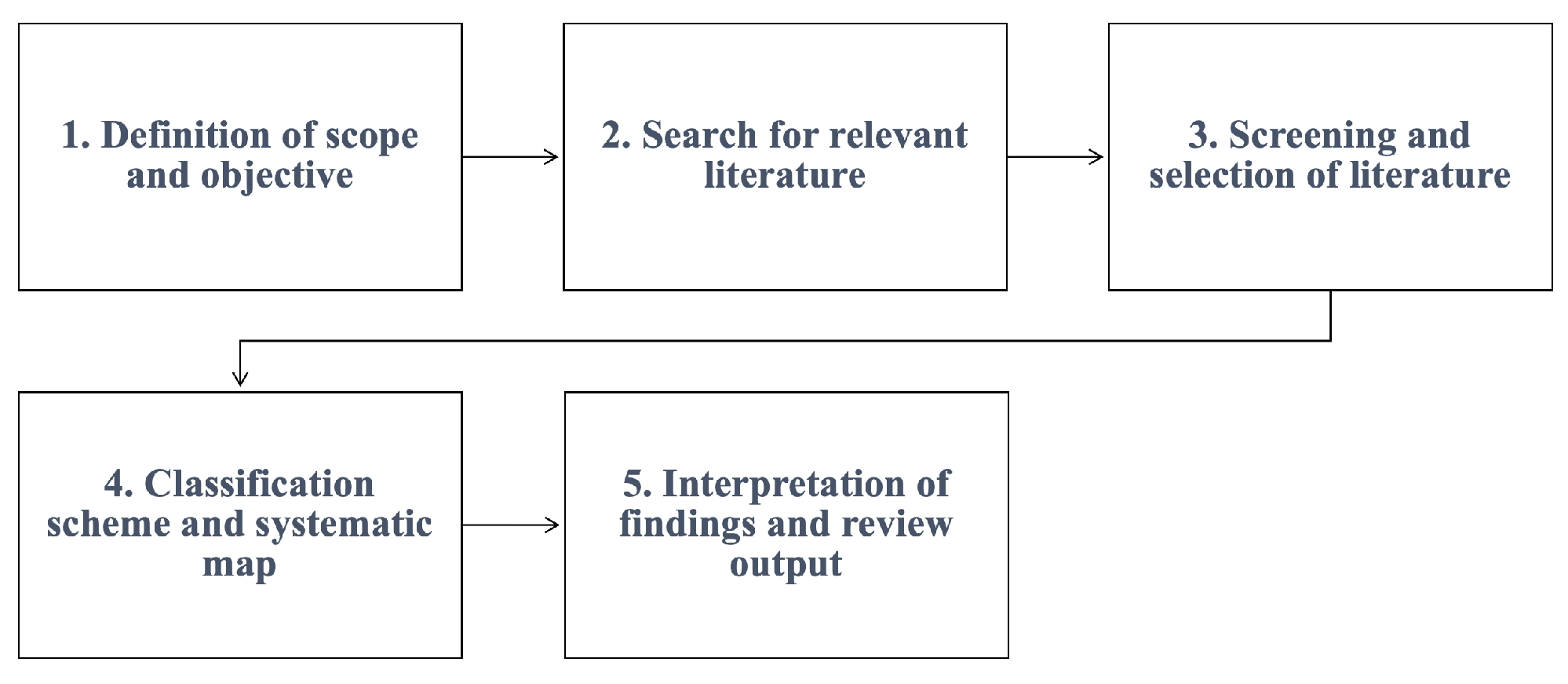
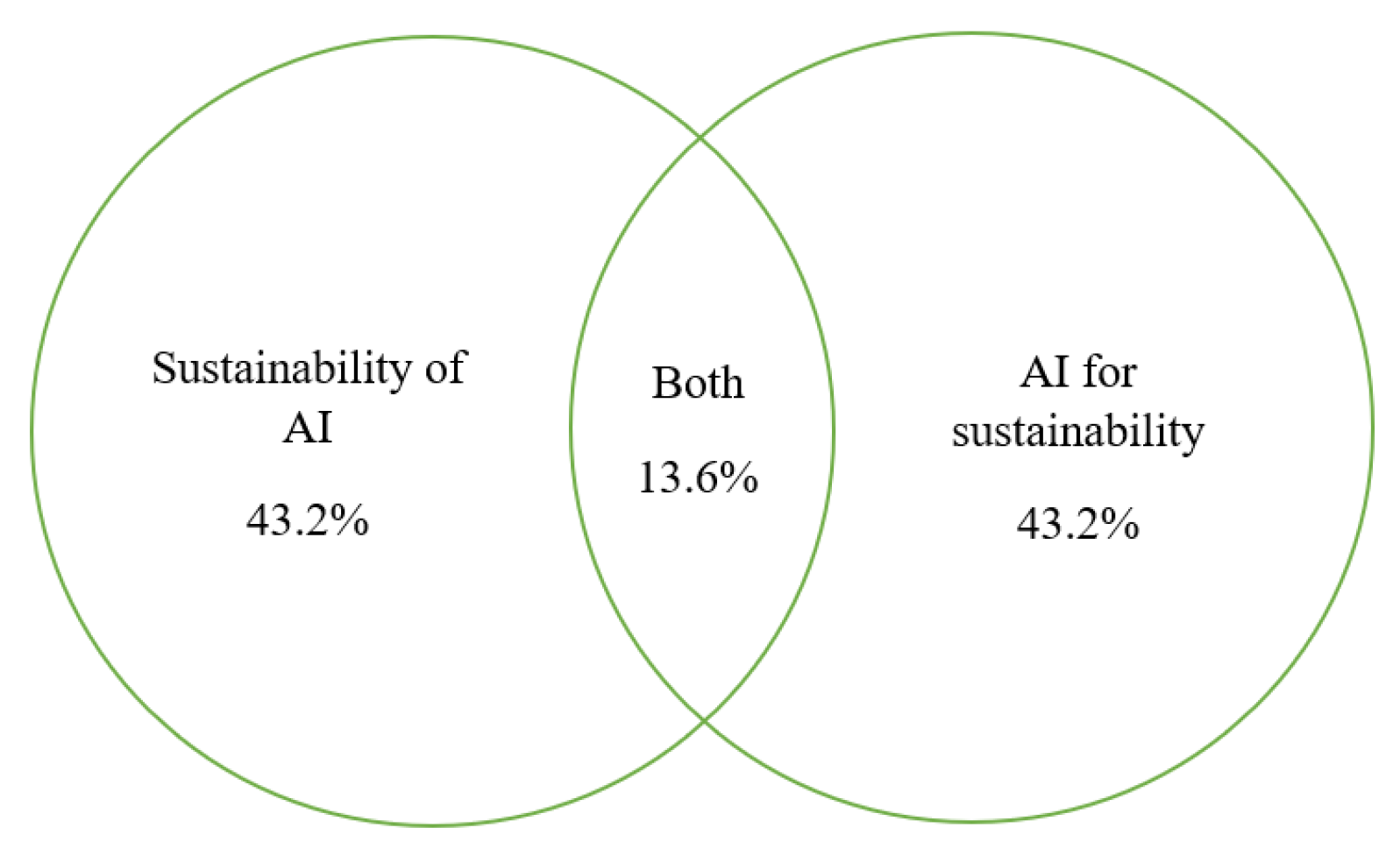
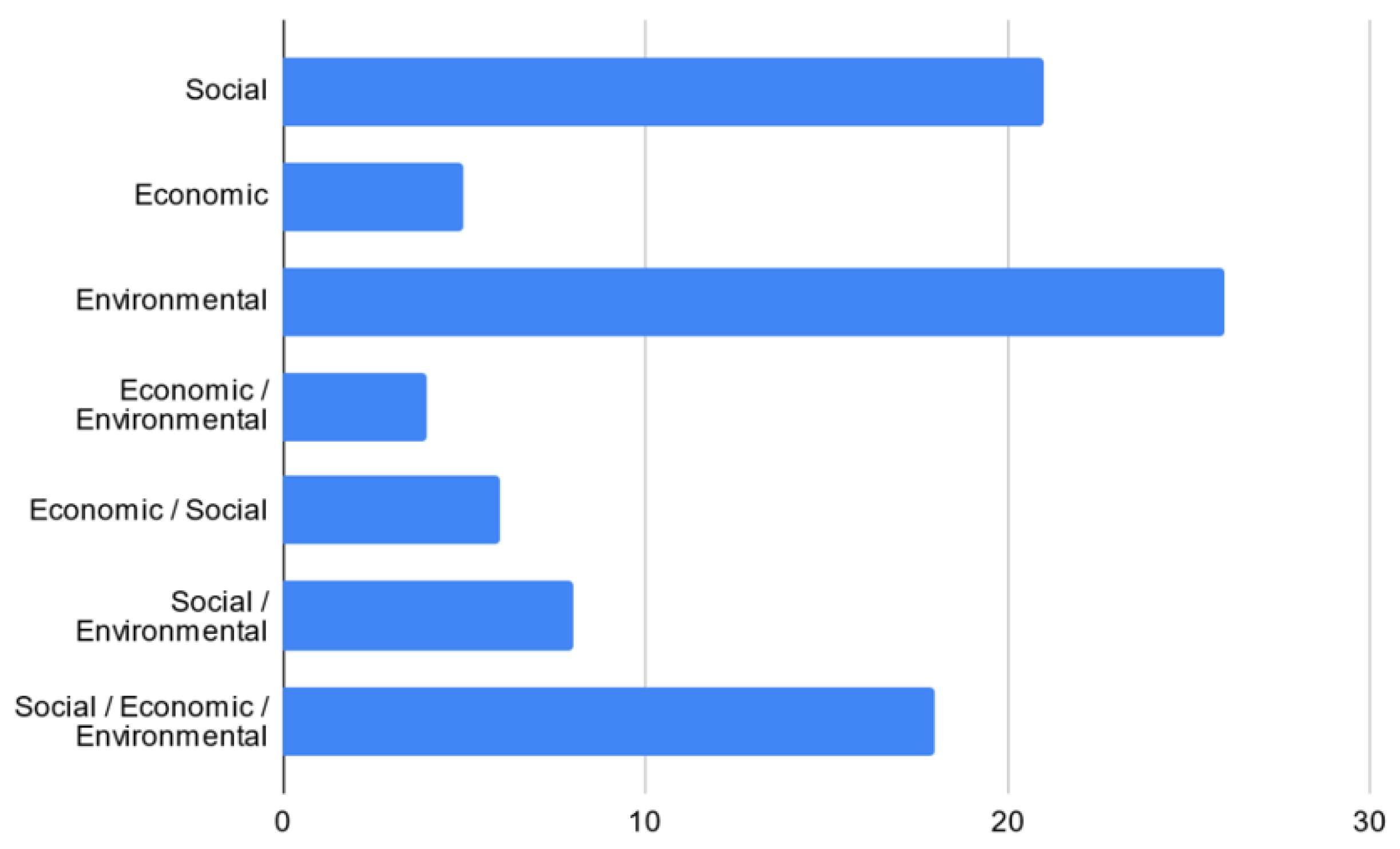
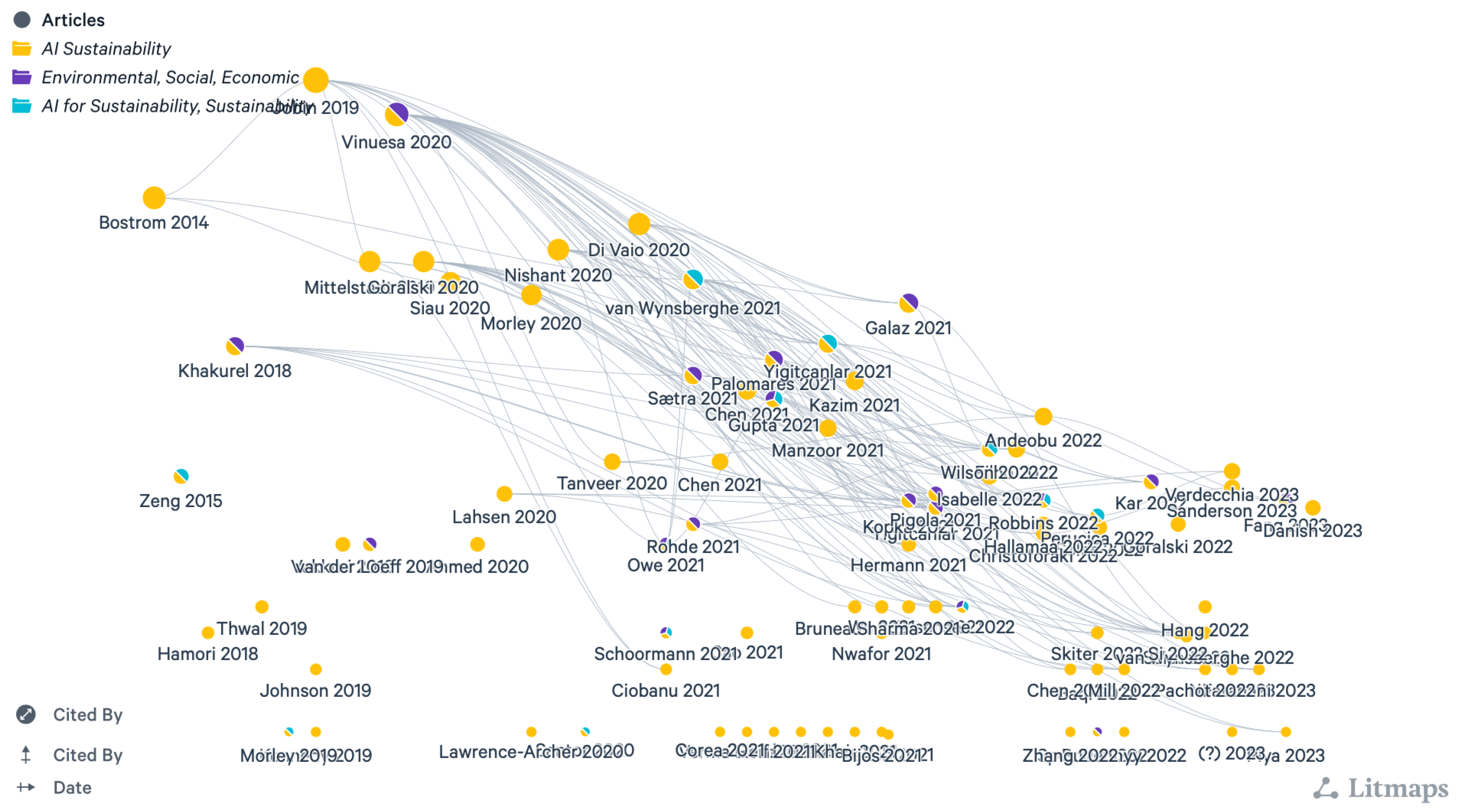
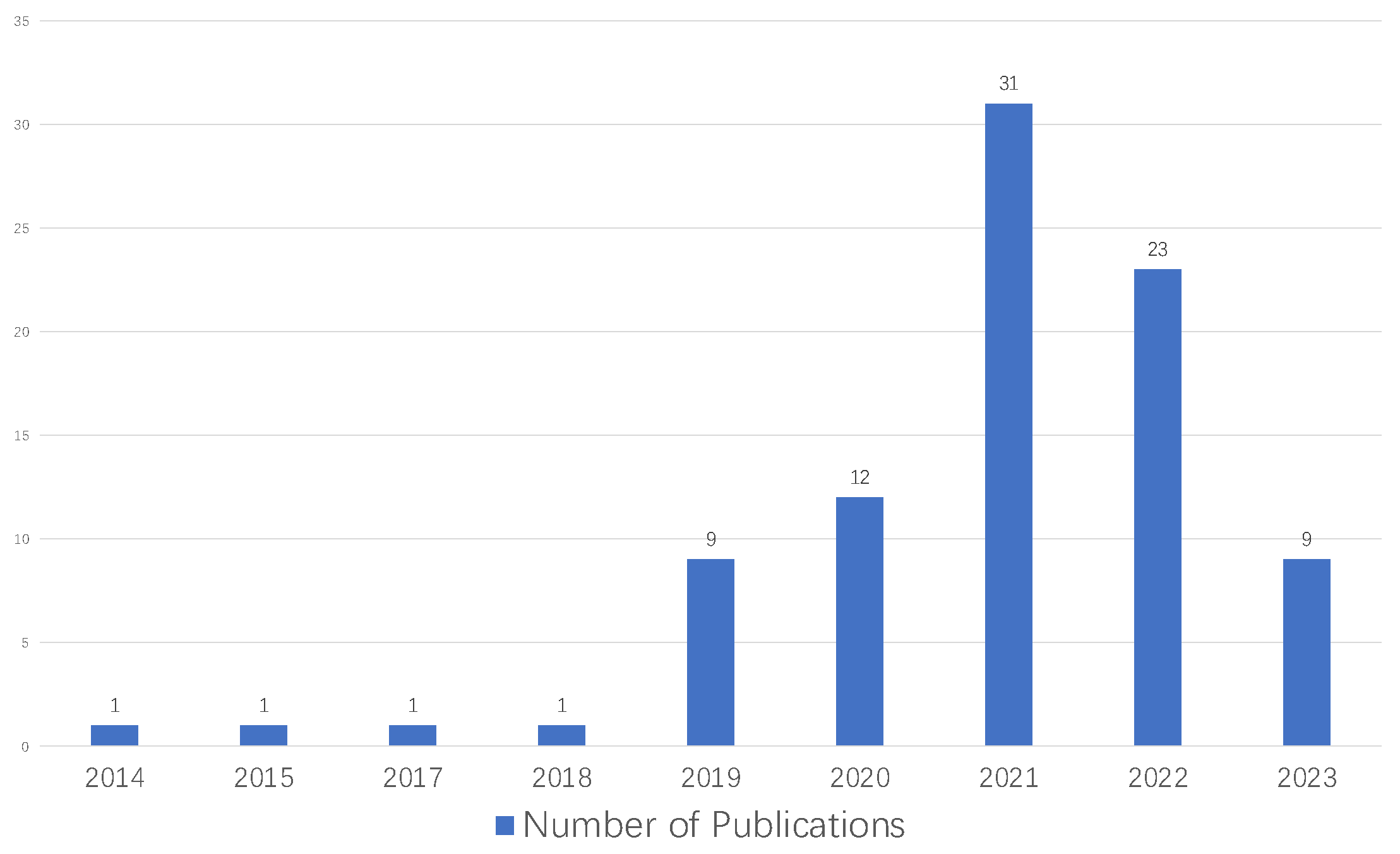


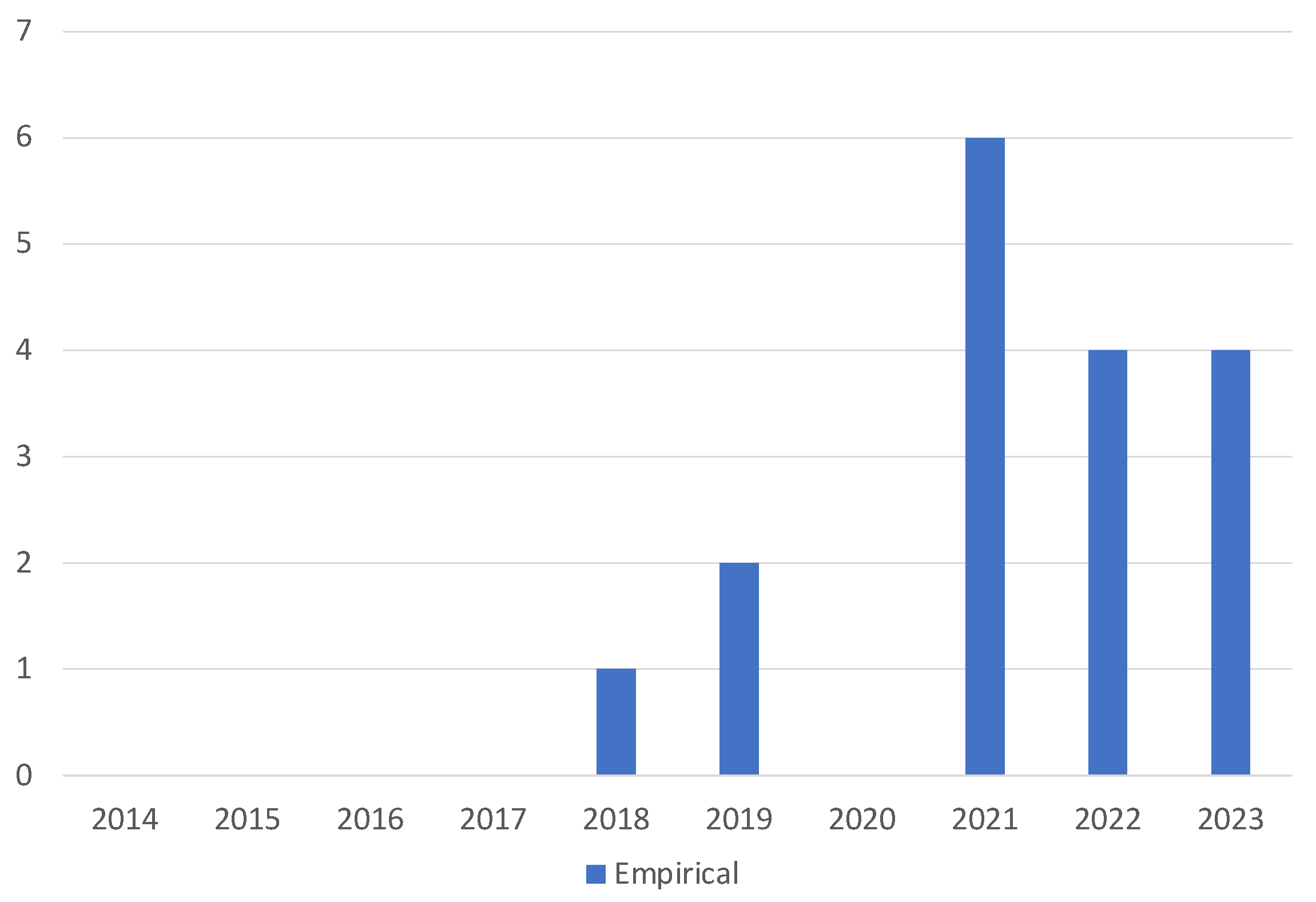

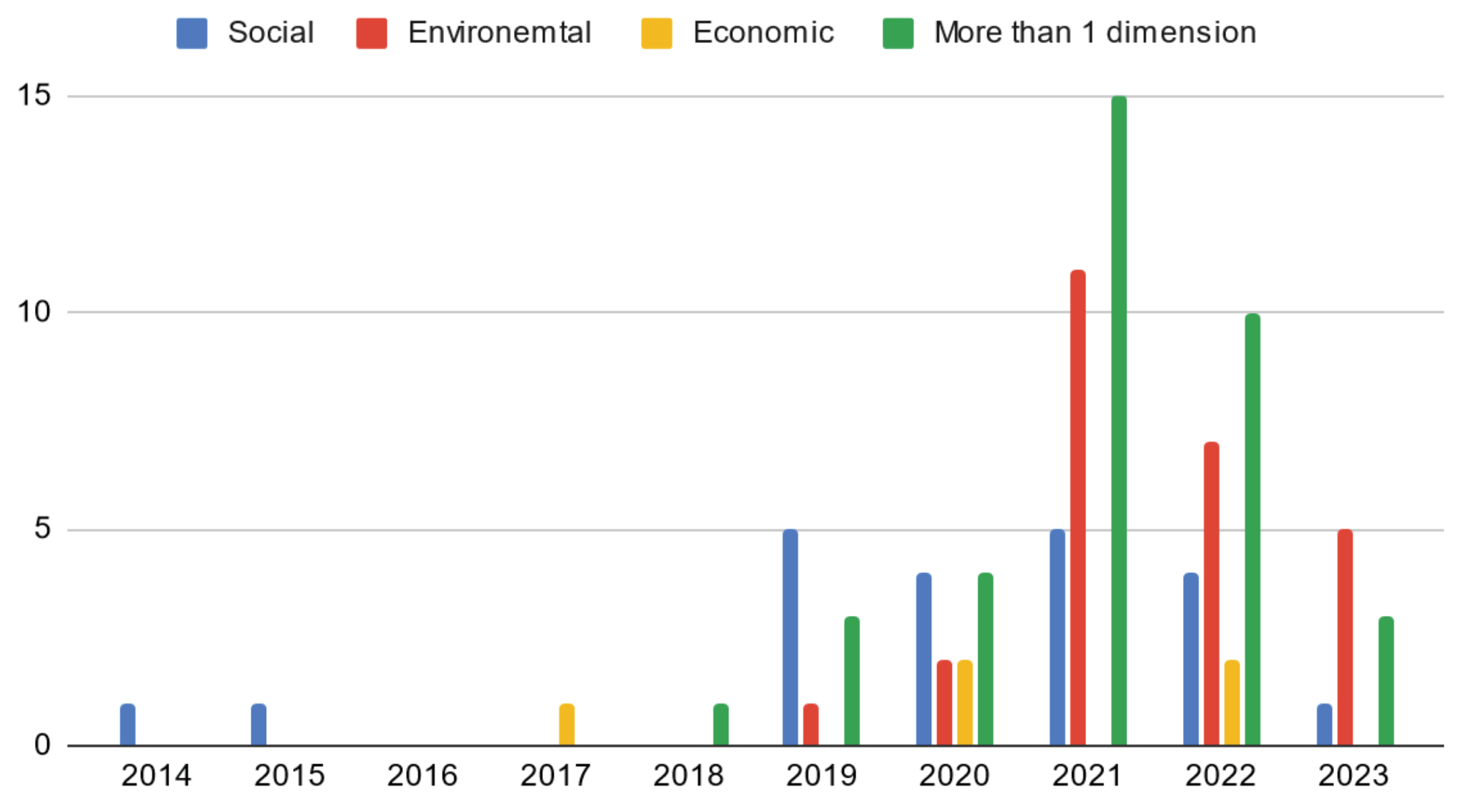
| No. | Title | Year | Author |
|---|---|---|---|
| 1 | The Ethics of Artificial Intelligence | 2014 | Bostrom and Yudkowsky [34] |
| 2 | AI Ethics: Science Fiction Meets Technological Reality | 2015 | Zeng [35] |
| 3 | Artificial Intelligence and Economic Growth | 2017 | Aghion et al. [36] |
| 4 | The Rise of Artificial Intelligence under the Lens of Sustainability | 2018 | Khakurel et al. [37] |
| 5 | Artificial Intelligence: the Global Landscape of Ethics Guidelines | 2019 | Jobin et al. [38] |
| 6 | Principles Alone Cannot Guarantee Ethical AI | 2019 | Mittelstadt [39] |
| 7 | AI Ethics in Industry: A Research Framework | 2019 | Vakkuri et al. [40] |
| 8 | AI Ethics for Systemic Issues: A Structural Approach | 2019 | van der Loeff et al. [41] |
| 9 | What Do Artificial Intelligence (AI) and Ethics of AI Mean in the Context of Research Libraries? | 2019 | Kennedy [42] |
| 10 | Technology Innovation and AI Ethics | 2019 | Johnson [43] |
| 11 | Edge AI based Waste Management System for Smart City | 2019 | Thwal et al. [44] |
| 12 | Economic impacts of artificial intelligence | 2019 | Szczepanski [45] |
| 13 | From What to How: An Initial Review of Publicly Available AI Ethics Tools, Methods and Research to Translate Principles into Practices | 2019 | Morley et al. [46] |
| 14 | Artificial Intelligence (AI) Ethics: Ethics of AI and Ethical AI | 2020 | Siau and Wang [47] |
| 15 | AI Ethics: How Can Information Ethics Provide A Framework To Avoid Usual Conceptual Pitfalls? An Overview | 2021 | Bruneault and Laflamme [48] |
| 16 | AI Ethics: A Strategic Communications Challenge | 2020 | Lawrence-Archer [49] |
| 17 | The Ethics Of AI In Health Care: A Mapping Review. | 2020 | Morley et al. [50] |
| 18 | Artificial Intelligence and Machine Learning in Waste Management and Recycling | 2020 | Ahmed and Asadullah [51] |
| 19 | Artificial Intelligence For Sustainability: Challenges, Opportunities, And A Research Agenda | 2020 | Nishant et al. [22] |
| 20 | The Role Of Artificial Intelligence In Achieving The Sustainable Development Goals | 2020 | Vinuesa et al. [52] |
| 21 | Should AI Be Designed To Save Us From Ourselves? | 2020 | Lahsen [53] |
| 22 | Academic Policy Regarding Sustainability and Artificial Intelligence (AI) | 2020 | Tanveer et al. [54] |
| 23 | Artificial Intelligence And Sustainable Development | 2020 | Goralski and Tan [55] |
| 24 | Artificial Intelligence And Business Models In The Sustainable Development Goals Perspective: A Systematic Literature Review | 2020 | Di Vaio et al. [56] |
| 25 | The Impact of Digitalization on the Economy: A Review Article on the NBER Volume “Economics of Artificial Intelligence: An Agenda” | 2020 | Santor [11] |
| 26 | Application Of Artificial Intelligence On The CO2 Capture: A Review | 2021 | Cao [57] |
| 27 | The Mutual Benefits Of Renewables And Carbon Capture: Achieved By An Artificial Intelligent Scheduling Strategy | 2021 | Chen et al. [58] |
| 28 | AI Ethics: A Call To Faculty | 2021 | Nourbakhsh [59] |
| 29 | A High-Level Overview of AI Ethics | 2021 | Kazim and Koshiyama [60] |
| 30 | AI Ethical Bias: A Case For AI Vigilantism (Ailantism) In Shaping The Regulation of AI | 2021 | Nwafor [61] |
| 31 | Ethical Review in The Age of Artificial Intelligence | 2021 | Heo [62] |
| 32 | AI Ethics In Business—A Bibliometric Approach | 2021 | Ciobanu and Meșniță [63] |
| 33 | Artificial Intelligence: Ethical And Social Considerations | 2021 | Corea [64] |
| 34 | Artificial Intelligence Based E-Waste Management For Environmental Planning | 2021 | Chen et al. [65] |
| 35 | AI Waste Prevention: Time and Power Estimation for Edge Tensor Processing Units | 2021 | Reif et al. [66] |
| 36 | Emerging Role Of Artificial Intelligence In Waste Management Practices | 2021 | Sharma and Vaid [67] |
| 37 | Towards Artificial Intelligence In Urban Waste Management: An Early Prospect For Latin America | 2021 | Bijos et al. [68] |
| 38 | Sustainable AI: AI for Sustainability And The Sustainability Of AI | 2021 | Van Wynsberghe [18] |
| 39 | Artificial Intelligence, Systemic Risks, And Sustainability | 2021 | Galaz et al. [29] |
| 40 | Artificial Intelligence In Research And Development For Sustainability: The Centrality Of Explicability And Research Data Management | 2022 | Hermann and Hermann [69] |
| 41 | AI in Context and the Sustainable Development Goals: Factoring in the Unsustainability of the Sociotechnical System | 2021 | Sætra [9] |
| 42 | Assessing Whether Artificial Intelligence Is An Enabler Or An Inhibitor Of Sustainability At Indicator Level | 2021 | Gupta et al. [70] |
| 43 | The Ethics of Sustainability for Artificial Intelligence | 2021 | Owe and Baum [71] |
| 44 | Sustainability Challenges of Artificial Intelligence and Policy Implications | 2021 | Rohde et al. [72] |
| 45 | Sustainable AI: Environmental Implications, Challenges and Opportunities | 2022 | Wu et al. [73] |
| 46 | Artificial Intelligence for Sustainable Energy: A Contextual Topic Modeling and Content Analysis | 2021 | Saheb and Dehghani [74] |
| 47 | Greening the Artificial Intelligence for a Sustainable Planet: An Editorial Commentary | 2021 | Yigitcanlar [75] |
| 48 | A Panoramic View And Swot Analysis Of Artificial Intelligence For Achieving The Sustainable Development Goals By 2030: Progress And Prospects | 2021 | Palomares et al. [76] |
| 49 | Sustainable Artificial Intelligence: A Corporate Culture Perspective | 2021 | Isensee et al. [77] |
| 50 | Green Artificial Intelligence: Towards an Efficient, Sustainable and Equitable Technology for Smart Cities and Futures | 2021 | Yigitcanlar et al. [78] |
| 51 | Influence of Artificial Intelligence in Civil Engineering toward Sustainable Development—A Systematic Literature Review | 2021 | Manzoor et al. [79] |
| 52 | Artificial Intelligence-Driven Digital Technologies to the Implementation of the Sustainable Development Goals: A Perspective from Brazil and Portugal | 2021 | Pigola et al. [80] |
| 53 | Impact of AI on Environment | 2021 | Verma et al. [81] |
| 54 | Achieving Sustainability with Artificial Intelligence—A Survey of Information Systems Research | 2021 | Schoormann et al. [82] |
| 55 | Application of Disruptive Technologies on Environmental Health: An overview of artificial intelligence, blockchain and internet of things | 2021 | Kumar et al. [83] |
| 56 | Ethics of AI: A Systematic Literature Review of Principles and Challenges | 2021 | Khan et al. [84] |
| 57 | AI Ethics—A Bird’s Eye View | 2022 | Christoforaki and Beyan [85] |
| 58 | AI Ethics as Applied Ethics | 2022 | Hallamaa and Kalliokoski [86] |
| 59 | Artificial Intelligence Applications For Sustainable Solid Waste Management Practices In Australia: A Systematic Review. | 2022 | Andeobu et al. [87] |
| 60 | Artificial Intelligence with Earthworm Optimization Assisted Waste Management System for Smart Cities | 2023 | Rajalakshmi et al. [88] |
| 61 | How Can Artificial Intelligence Impact Sustainability: A Systematic Literature Review | 2022 | Kar et al. [23] |
| 62 | How To Realize The Full Potentials Of Artificial Intelligence (AI) In Digital Economy? A Literature Review | 2022 | Hang and Chen [89] |
| 63 | ECO2AI: Carbon Emissions Tracking Of Machine Learning Models As The First Step Towards Sustainable AI | 2022 | Budennyy et al. [90] |
| 64 | Is the future of AI Sustainable? A Case Study of the European Union | 2022 | Perucica and Andjelkovic [91] |
| 65 | A Survey on AI Sustainability: Emerging Trends on Learning Algorithms and Research Challenges | 2022 | Chen et al. [20] |
| 66 | Sustainable AI: An Integrated Model to Guide Public Sector Decision-Making | 2022 | Wilson and Van Der Velden [92] |
| 67 | Managing Sustainability Tensions in Artificial Intelligence: Insights from Paradox Theory | 2022 | Mill et al. [93] |
| 68 | Note: Leveraging Artificial Intelligence To Build A Data Catalog And Support Research On The Sustainable Development Goals | 2022 | Spezzatti et al. [94] |
| 69 | Towards Sustainable Artificial Intelligence: An Overview of Environmental Protection Uses and Issues | 2022 | Pachot and Patissier [95] |
| 70 | A Systematic Mapping of Artificial Intelligence Solutions for Sustainability Challenges in Latin America and the Caribbean | 2022 | Salas et al. [96] |
| 71 | A Framework to Analyze the Impacts of AI with the Sustainable Development Goals | 2022 | Si [97] |
| 72 | Our New Artificial Intelligence Infrastructure: Becoming Locked into an Unsustainable Future | 2022 | Robbins and Van Wynsberghe [98] |
| 73 | Special Issue “Towards the Sustainability of AI; Multi-Disciplinary Approaches to Investigate the Hidden Costs of AI” | 2022 | Van Wynsberghe et al. [99] |
| 74 | Artificial Intelligence and Poverty Alleviation: Emerging Innovations and Their Implications for Management Education and Sustainable Development | 2022 | Goralski and Tan [100] |
| 75 | A Review and Categorization of Artificial Intelligence-Based Opportunities in Wildlife, Ocean and Land Conservation | 2022 | Isabelle and Westerlund [101] |
| 76 | Sustainable Development of Enterprises in Conditions of Smart Ecology: Analysis of The Main Problems and Development of Ways to Solve Them, Based on Artificial Intelligence Methods and Innovative Technologies | 2022 | Skiter et al. [102] |
| 77 | Embedding Artificial Intelligence and Green Ideology in Formulating Corporate and Marketing Strategies | 2022 | Baqi et al. [103] |
| 78 | Artificial intelligence: Catalyst or Barrier on the Path to Sustainability? | 2022 | Kopka and Grashof [104] |
| 79 | On the Impact of Artificial Intelligence on Economy | 2022 | Solos and Leonard [105] |
| 80 | A Systematic Review of Green AI | 2023 | Verdecchia et al. [24] |
| 81 | AI Ethics Principles in Practice: Perspectives of Designers and Developers | 2023 | Sanderson et al. [106] |
| 82 | Waste Classification Using Artificial Intelligence Techniques:Literature Review | 2023 | Nasir and Aziz Al-Talib [107] |
| 83 | Shaping the Future of Sustainable Energy through AI-Enabled Circular Economy Policies | 2023 | Danish and Senjyu [108] |
| 84 | Artificial Intelligence for Waste Management in Smart Cities: A Review | 2023 | Fang et al. [109] |
| 85 | Deploying Digitalisation and Artificial Intelligence in Sustainable Development Research | 2023 | Leal Filho et al. [110] |
| 86 | Applications of Artificial Intelligence in Social Science Issues: A Case Study on Predicting Population Change | 2023 | Farahani [111] |
| 87 | Sustainable Development Goals Applied to Digital Pathology and Artificial Intelligence Applications in Low- to Middle-Income Countries | 2023 | Piya and Lennerz [112] |
| 88 | Research on the Impact of Artificial Intelligence Technology on Green Innovation | 2022 | Zhang [113] |
| AI for Sustainability | Sustainability of AI | Both | Total | |
|---|---|---|---|---|
| Social | 3 | 15 | 3 | 21 |
| Economic | 2 | 2 | 1 | 5 |
| Environmental | 16 | 7 | 3 | 26 |
| Economic/Environmental | 3 | 1 | 0 | 4 |
| Economic/Social | 1 | 5 | 0 | 6 |
| Social/Environmental | 4 | 4 | 0 | 8 |
| Social/Economic/Environmental | 9 | 4 | 5 | 18 |
| Total | 38 | 38 | 12 | 88 |
| Category | Description |
|---|---|
| Validation Research | Techniques investigated are novel and have not yet been implemented in practice. Techniques used are, for example, experiments, i.e., work done in the lab. |
| Evaluation Research | Techniques are implemented in practice and an evaluation of the technique is conducted. That means it is shown how the technique is implemented in practice (solution implementation) and what are the consequences of the implementation in terms of benefits and drawbacks (implementation evaluation). This also includes identifying problems in the industry. |
| Solution Proposal | A solution to a problem is proposed. The solution can be either novel or a significant extension of an existing technique. The potential benefits and the applicability of the solution are shown by a small example or a good line of argumentation. |
| Philosophical Papers | These papers sketch a new way of looking at existing things by structuring the field in the form of a taxonomy or conceptual framework. |
| Opinion Papers | These papers express the personal opinion of somebody on whether a certain technique is good or bad, or how things should be done. They do not rely on related work and research methodologies. |
| Experience Papers | Experience papers explain what and how something has been done in practice. It has to be the personal experience of the author. |
| Research Fields | Count of Author | Percentage |
|---|---|---|
| Information Systems | 126 | 39.75% |
| Engineering & Technology | 71 | 22.40% |
| Social Science | 40 | 12.62% |
| Business Administration | 35 | 11.04% |
| Health Science | 15 | 4.73% |
| Natural Science | 13 | 4.10% |
| Not Available | 8 | 2.52% |
| Law | 6 | 1.89% |
| Banking & Finance | 3 | 0.95% |
| Total | 317 | 100% |
Disclaimer/Publisher’s Note: The statements, opinions and data contained in all publications are solely those of the individual author(s) and contributor(s) and not of MDPI and/or the editor(s). MDPI and/or the editor(s) disclaim responsibility for any injury to people or property resulting from any ideas, methods, instructions or products referred to in the content. |
© 2024 by the authors. Licensee MDPI, Basel, Switzerland. This article is an open access article distributed under the terms and conditions of the Creative Commons Attribution (CC BY) license (https://creativecommons.org/licenses/by/4.0/).
Share and Cite
Dhiman, R.; Miteff, S.; Wang, Y.; Ma, S.-C.; Amirikas, R.; Fabian, B. Artificial Intelligence and Sustainability—A Review. Analytics 2024, 3, 140-164. https://doi.org/10.3390/analytics3010008
Dhiman R, Miteff S, Wang Y, Ma S-C, Amirikas R, Fabian B. Artificial Intelligence and Sustainability—A Review. Analytics. 2024; 3(1):140-164. https://doi.org/10.3390/analytics3010008
Chicago/Turabian StyleDhiman, Rachit, Sofia Miteff, Yuancheng Wang, Shih-Chi Ma, Ramila Amirikas, and Benjamin Fabian. 2024. "Artificial Intelligence and Sustainability—A Review" Analytics 3, no. 1: 140-164. https://doi.org/10.3390/analytics3010008
APA StyleDhiman, R., Miteff, S., Wang, Y., Ma, S.-C., Amirikas, R., & Fabian, B. (2024). Artificial Intelligence and Sustainability—A Review. Analytics, 3(1), 140-164. https://doi.org/10.3390/analytics3010008







